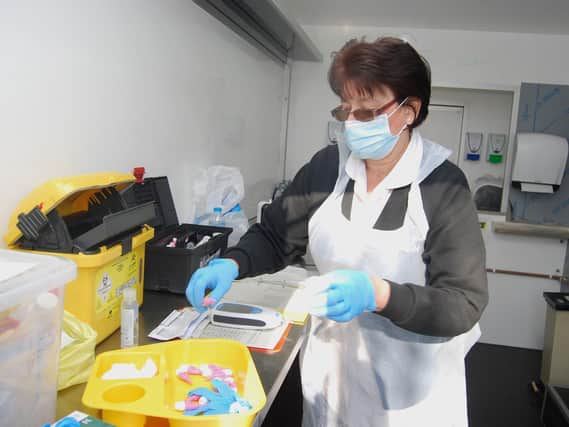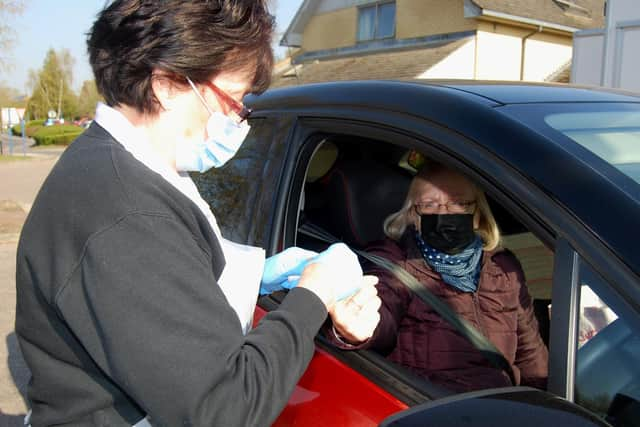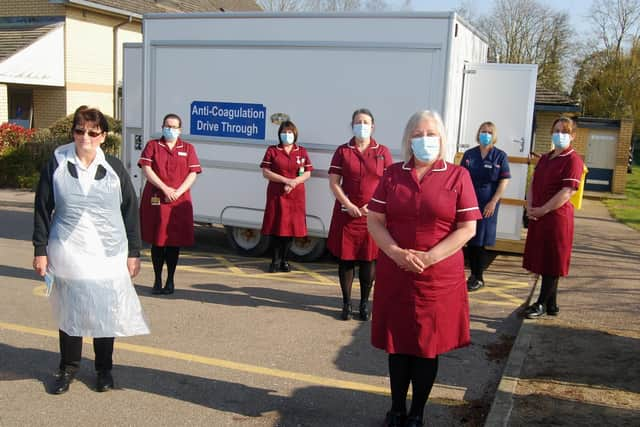How KGH used fast-food trailer to beat dilemma and test hundreds of clinically vulnerable patients


How do you give regular blood tests to clinically vulnerable people who need to shield during a pandemic?
An innovative team at Kettering General Hospital came up with the answer - set up a service using a fast-food trailer in a car park.
Advertisement
Hide AdAdvertisement
Hide AdThe Rothwell Road hospital's anticoagulation team created the INR Drive-Through Service, offering a blood test that measures the time it takes for the blood to clot, for patients who need regular tests while taking the blood-thinning drug warfarin - used to treat serious heart and pulmonary conditions.


At the start of the pandemic thousands of INR patients across the country were asked to shield because they were at risk of death or serious illness from Covid.
Many of these patients were nervous about travelling in to hospital to have their regular tests - so the hospital developed a drive-through service using a fast-food trailer in one of its car parks.
And just over a year on they're celebrating their work, which has been replicated elsewhere in the country.
Advertisement
Hide AdAdvertisement
Hide AdLead nurse for anticoagulation Tess Page said: “When the pandemic struck hospitals across the country had a dilemma.


“It was vital that we continued to provide blood tests for our patients who receive warfarin – but at the same time these were patients who needed to shield because they were so clinically vulnerable.
“We decided on a drive-through service and were one of the first hospitals in the country to do this on March 29, 2020.
“We wanted to be out in an open car park area but still have a place where we could keep our paperwork, wash our hands, store equipment and PPE, and be protected from the weather.
Advertisement
Hide AdAdvertisement
Hide Ad“And that’s where the fast-food trailer came in. It enabled people to drive into the Diabetes Centre car park at the hospital and have thumb prick blood sample taken in their car.
“We then use a portable analysis device to give them their result – with a follow-up telephone appointment if more support was needed.”
The fast-food trailer also added a bit of humour to patients’ appointments.
Tess said: “Some of our patients felt lonely and isolated during the pandemic and being able to have a chat with a nurse and have their test made them feel much better.
Advertisement
Hide AdAdvertisement
Hide Ad“Using the fast-food trailer also added a bit of humour to the situation. They would say things like ‘can I have chips with my test’. It made us all smile.”
Mel Jarvis, 77, from Gretton, is one of the service’s regular patients. He has been on warfarin for 19 years since a prosthetic heart valve operation in 2002.
He said: “I am one of those patients who were advised to shield during Covid but I still needed weekly, or sometimes twice weekly, blood tests.
“Having the drive-through service felt a very safe and very effective way of delivering this test and I think it was a brilliant idea – and those who came up with should be commended.”
Advertisement
Hide AdAdvertisement
Hide AdJean Spencer, 75, from Kettering, takes warfarin because she has the heart condition atrial fibrillation, but also has an autoimmune muscle-wasting condition called inclusion body myositis, which affects her mobility.
She said: “Having the drive-through service has been a brilliant way of delivering blood tests during the pandemic.
“You just drive up in the early morning and get the thumb-prick test which doesn’t take very long at all.
“You feel safer than waiting in a hospital environment and it is good for me because I don’t have to try to walk across to the hospital which can be quite a struggle.”
Advertisement
Hide AdAdvertisement
Hide AdThe pandemic has also been a testing time for the hospital’s anticoagulation team because Covid-19 has taken a terrible toll on their patients.
The anticoagulation service at KGH had enquiries about its service from trusts across England, including a trust in Bradford where a clinical nurse specialist set up a INR drive-through clinic in the back of an old ambulance, and also from a pharmacist in Amersham who enquired about how to set up a drive-through for her service.
KGH has maintained its anticoagulation service throughout the pandemic including home visits for some of its INR test patients – but to have tried to do this for all its 2,500 patients would have led to testing delays.
The drive-through service will continue until the end of May and then, pandemic permitting, normal in-hospital services are due to re-start.
Advertisement
Hide AdAdvertisement
Hide AdTess said: “We know many of our patients well because they come to us so often – sometimes twice a week. Sadly Covid-19 has taken its toll and we have lost quite a few of them. It has had an impact on us.
“But the drive-through service has helped to keep them as safe as we can and we have supported more than 1,400 patients since March.
“Patients have been very grateful for the service and our staff have worked very hard, in all weathers, to provide it.”
The KGH team thanked many individuals and staff teams which supported the service and got it up and running including: Garry Wagstaff from 4Sure in Corby for donating the fast food trailer for the team’s use for the first six months for free, the redeployed ophthalmology staff who supported the initiative in the earlier part of the pandemic and the estates team for ‘hooking’ up the burger van to electricity, building the custom made steps and putting up the essential clinic signage.